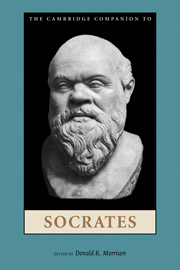Book contents
- Frontmatter
- 1 The Rise and Fall of the Socratic Problem
- 2 The Students of Socrates
- 3 Xenophon and the Enviable Life of Socrates
- 4 Socrates in Aristophanes’ Clouds
- 5 Socrates and the New Learning
- 6 Socratic Religion
- 7 Socrates and Democratic Athens
- 8 Socratic Method
- 9 Self-Examination
- 10 Socratic Ignorance
- 11 Reconsidering Socratic Irony
- 12 Socratic Ethics and the Socratic Psychology of Action
- 13 Socrates and Eudaimonia
- 14 Socrates’ Political Philosophy
- 15 Socrates in Later Greek Philosophy
- Socrates Bibliography
- Index of Names and Subjects
- Index of Passages
4 - Socrates in Aristophanes’ Clouds
Published online by Cambridge University Press: 28 March 2011
- Frontmatter
- 1 The Rise and Fall of the Socratic Problem
- 2 The Students of Socrates
- 3 Xenophon and the Enviable Life of Socrates
- 4 Socrates in Aristophanes’ Clouds
- 5 Socrates and the New Learning
- 6 Socratic Religion
- 7 Socrates and Democratic Athens
- 8 Socratic Method
- 9 Self-Examination
- 10 Socratic Ignorance
- 11 Reconsidering Socratic Irony
- 12 Socratic Ethics and the Socratic Psychology of Action
- 13 Socrates and Eudaimonia
- 14 Socrates’ Political Philosophy
- 15 Socrates in Later Greek Philosophy
- Socrates Bibliography
- Index of Names and Subjects
- Index of Passages
Summary
“Aristophanes has come very close to the truth in his depiction of Socrates.”
Kierkegaard 1989In Plato’s Apology, a version of the defense speech that Socrates delivered in 399 when he was charged with the potentially capital offense of introducing new gods and corrupting the youth of Athens, Socrates divides his accusers into two groups. On the one hand, there are Anytus and his cronies, who have fi led the complaint and hauled him into court. These men are dangerous enough, he says, but he fears another group, much more: “those who have taken the majority of you in from childhood, persuading you and laying the utterly untruthful charge that a certain Socrates is an intellectual, a theorist about the firmament, an investigator of everything that lies beneath the earth, and one who makes the weaker argument the stronger” (Apology 18A-B). These antagonists are numerous and have been misrepresenting Socrates for a long while, infecting the minds of the jurors when they were still young and impressionable, with no one on hand to raise objections. But the worst of it is that they are anonymous, “save if one of them happens to be a comic poet” (18C). The influence of these ancient accusers, Socrates asserts, is evident in the indictment that has been brought against him, which mentions just such pursuits on his part. For, Socrates tells the jurors, “you yourselves have seen, in Aristophanes’ comedy, a kind of Socrates carried aloft and claiming to walk on air and uttering all sorts of other nonsense, about which I know nothing whatever, neither much nor little” (19C).
- Type
- Chapter
- Information
- The Cambridge Companion to Socrates , pp. 75 - 90Publisher: Cambridge University PressPrint publication year: 2010
- 10
- Cited by

